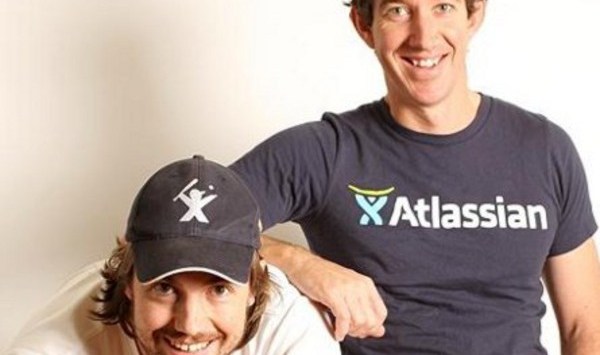

Former Smart50 winner Atlassian is pushing ahead with plans to list in the United States, with reports the software development company has filed papers for an initial public offering.
The software developer’s slated float, which according to the Wall Street Journal will occur before year’s end, has been on the cards for some time, with experienced chief financial officer Erik Bardman joining the company in February.
The filing also comes as Atlassian celebrated an important milestone last week: reaching 50,000 active customers.
According to the WSJ Atlassian, which has an estimated valuation of more than $3 billion, filed its prospectus under a US piece of legislation called the Jumpstart Our Business Startups (JOBS) Act, which allows companies with less than $US1 billion ($1.42 billion) in revenue to file confidential IPO paperwork.
Atlassian co-founder Mike Cannon-Brookes told SmartCompany earlier this year appointing Bardman as chief financial officer was “obviously a key step towards being a public company”.
“On our journey we do think a little differently, but going public with a CFO is a little too different even for us,” he said.
Cannon-Brookes, who founded Atlassian with Scott Farquhar in 2002 using a $10,000 credit card, revealed the company had been on the IPO “journey” for some time.
Back in February, he still wouldn’t indicate when a float would take place.
“We are in the lucky spot to be in control of our own destiny being profitable and fast growth,” he said.
“We want to do it right. There are very few opportunities for Australian companies to do this so we certainly don’t want to screw it up.”
Cannon-Brookes and Farquhar are estimated to own 78% of the company, with a combined wealth of $2.1 billion.
Already members of the BRW Rich List, a successful listing of Atlassian would likely catapult the duo in the richest 20 Australians.
Atlassian has been just one of the Australian tech success stories in the spotlight in the past week, as both Prime Minister Malcolm Turnbull and Opposition Leader Bill Shorten seek to make startups a key part of their policy platforms.
Shorten said this morning Atlassian’s success “shows what startups can achieve and how they can drive our economy in the future”.
The success of @Atlassian shows what startups can achieve & how they can drive our economy in the future #code #STEM https://t.co/1fcV92YEqy
— Bill Shorten (@billshortenmp) September 27, 2015
Rebekah Campbell, founder and chief executive of Posse, told SmartCompany this morning Atlassian listing will “absolutely” have a positive impact on the Australian startup ecosystem.
“Any time there is a major exit like that, it has an impact on the amount that investors look at certinaly,” Campbell says.
“But the bigger longer term impact of raising the profile of these types of events is it leads to younger kids and aspiring entrepreneurs think they can do that.”
Campbell says she is personally inspired by the Farquhar and Cannon-Brookes’ success, as they “did it themselves and raised money in the very best way through their customers”.
“It’s a really inspiring story that you can bootstrap, determine proof of concept through your customers and build a real company,” she says.
Campbell says Atlassian’s story also shows budding entrepreneurs that it can take years to “create real value”.
“It’s like building a house, it takes a long time and if you do it in the best possible way, it will be more robust,” she says.
For Campbell, Farquhar and Cannon-Brookes have also been “incredible for the industry”.
“Personally, they spent hours with me when I was first starting. They are so busy but they give so much,” she adds.
Celebrating Atlassian’s customer milestone last week, Farquhar blogged about how far he and Cannon-Brookes had come and that “dreams can come true”. Reaching 50,000 customers was the pair’s “big, hairy audacious goal” when they first started out in 2002.
“$48,500. That was the PricewaterhouseCoopers salary that I turned down in 2002 to start Atlassian with Mike Cannon-Brookes,” Farquhar said.
“There was no technology industry in Australia at the time, not a startup industry. Our university professors disowned us. Our parents looked the other way. Our original goal was to earn more than $48,500 and not to have to wear a suit to work.”
“It’s been a 10-year journey since we set that goal, and we’ve had huge ups and downs.
“We’ve also hit some incredibly milestones along the way: selling into over 100 countries, reaching a billion dollars in all-time sales, establishing offices in four continents, winning Australia’s Entrepreneur of the Year, hitting 100 (then 1000, then 1500) staff, becoming Australia’s best place to work two years in a row.
“We’ve donated $5.8 million to charity and helped hundreds of thousands of children get an education, Millions of people use our products on a daily basis and are more successful because of it.”
SmartCompany contacted Farquhar and Cannon-Brookes but did not receive a response prior to publication.


COMMENTS
SmartCompany is committed to hosting lively discussions. Help us keep the conversation useful, interesting and welcoming. We aim to publish comments quickly in the interest of promoting robust conversation, but we’re a small team and we deploy filters to protect against legal risk. Occasionally your comment may be held up while it is being reviewed, but we’re working as fast as we can to keep the conversation rolling.
The SmartCompany comment section is members-only content. Please subscribe to leave a comment.
The SmartCompany comment section is members-only content. Please login to leave a comment.